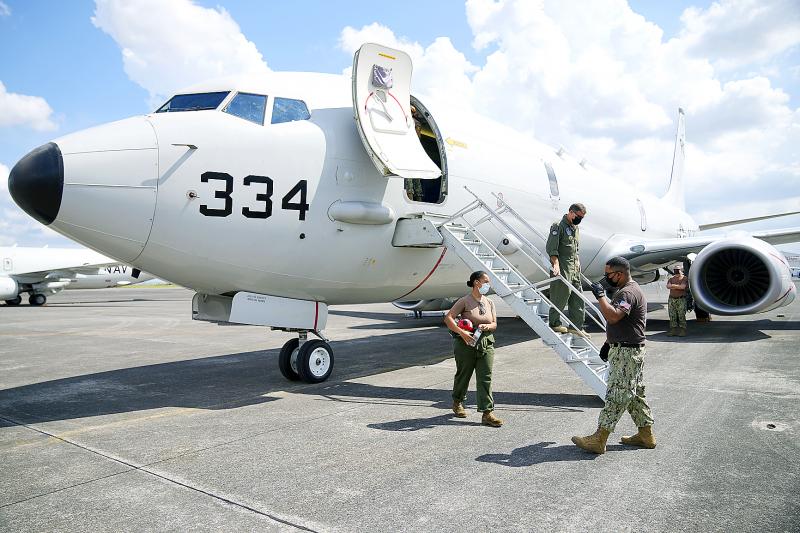The passage of a US Navy P-8A Poseidon aircraft through the Taiwan Strait on Friday was aimed at countering China’s claims to the waterway and its “systematic expansion” in the region, local military experts said.
The flight of the maritime patrol reconnaissance plane was a response to China’s assertion that the Taiwan Strait is not international waters, Institute for National Defense and Security Research analyst Su Tzu-yun (蘇紫雲) said.
It was also aimed at countering the expansion of China’s military presence in the region, for example its aircraft incursions into Taiwan’s air defense identification zone (ADIZ) and warships sailing through waters claimed by China and other countries in the South China Sea, Su said.

Photo: AP
Chinese and Russian naval vessels were also navigating Japan’s territorial waters, he added.
The US aircraft’s transit came after 29 Chinese military planes entered Taiwan’s ADIZ on Tuesday, the third-highest single-day total this year, and after Chinese Ministry of Foreign Affairs spokesman Wang Wenbin (汪文斌) told a news conference that the Taiwan Strait fell within China’s territorial waters.
The US Indo-Pacific Command said in a statement that the transit “demonstrates the United States’ commitment to a free and open Indo-Pacific,” CNN reported on Friday.
“The United States will continue to fly, sail and operate anywhere international law allows, including within the Taiwan Strait,” the statement read. “By operating within the Taiwan Strait in accordance with international law, the United States upholds the navigational rights and freedoms of all nations.”
The US’ rare move was apparently meant to counteract the harassment of Japan by Chinese and Russian ships, Institute for National Defense and Security Research analyst Shu Hsiao-huang (舒孝煌) said.
The Ministry of National Defense said that it has a full grasp of China’s military activity and has contingency measures in place to safeguard national security.
People’s Liberation Army Eastern Theater Command spokesman Colonel Shi Yi (施毅) criticized the US for “endangering the peace and stability in the Taiwan Strait” by flying the aircraft and publicizing the move.
The Eastern Theater Command had organized air and ground forces to monitor the US aircraft’s entire operation, he said.
China has stepped up its military activities near Taiwan in the past few years in response to what it sees as closer ties between Washington and Taipei.
The Democratic Progressive Party has accused Beijing of continuing to use military, diplomatic and economic means to intimidate Taiwan and neighboring countries in the Indo-Pacific region, heightening regional tensions and making no efforts to break the deadlock between the two sides.

SECURITY: As China is ‘reshaping’ Hong Kong’s population, Taiwan must raise the eligibility threshold for applications from Hong Kongers, Chiu Chui-cheng said When Hong Kong and Macau citizens apply for residency in Taiwan, it would be under a new category that includes a “national security observation period,” Mainland Affairs Council (MAC) Minister Chiu Chui-cheng (邱垂正) said yesterday. President William Lai (賴清德) on March 13 announced 17 strategies to counter China’s aggression toward Taiwan, including incorporating national security considerations into the review process for residency applications from Hong Kong and Macau citizens. The situation in Hong Kong is constantly changing, Chiu said to media yesterday on the sidelines of the Taipei Technology Run hosted by the Taipei Neihu Technology Park Development Association. With

A US Marine Corps regiment equipped with Naval Strike Missiles (NSM) is set to participate in the upcoming Balikatan 25 exercise in the Luzon Strait, marking the system’s first-ever deployment in the Philippines. US and Philippine officials have separately confirmed that the Navy Marine Expeditionary Ship Interdiction System (NMESIS) — the mobile launch platform for the Naval Strike Missile — would take part in the joint exercise. The missiles are being deployed to “a strategic first island chain chokepoint” in the waters between Taiwan proper and the Philippines, US-based Naval News reported. “The Luzon Strait and Bashi Channel represent a critical access

‘FORM OF PROTEST’: The German Institute Taipei said it was ‘shocked’ to see Nazi symbolism used in connection with political aims as it condemned the incident Sung Chien-liang (宋建樑), who led efforts to recall Democratic Progressive Party (DPP) Legislator Lee Kun-cheng (李坤城), was released on bail of NT$80,000 yesterday amid an outcry over a Nazi armband he wore to questioning the night before. Sung arrived at the New Taipei City District Prosecutors’ Office for questioning in a recall petition forgery case on Tuesday night wearing a red armband bearing a swastika, carrying a copy of Adolf Hitler’s Mein Kampf and giving a Nazi salute. Sung left the building at 1:15am without the armband and apparently covering the book with a coat. This is a serious international scandal and Chinese

COUNTERINTELLIGENCE TRAINING: The ministry said 87.5 percent of the apprehended Chinese agents were reported by service members they tried to lure into becoming spies Taiwanese organized crime, illegal money lenders, temples and civic groups are complicit in Beijing’s infiltration of the armed forces, the Ministry of National Defense (MND) said in a report yesterday. Retired service members who had been turned to Beijing’s cause mainly relied on those channels to infiltrate the Taiwanese military, according to the report to be submitted to lawmakers ahead of tomorrow’s hearing on Chinese espionage in the military. Chinese intelligence typically used blackmail, Internet-based communications, bribery or debts to loan sharks to leverage active service personnel to do its bidding, it said. China’s main goals are to collect intelligence, and develop a